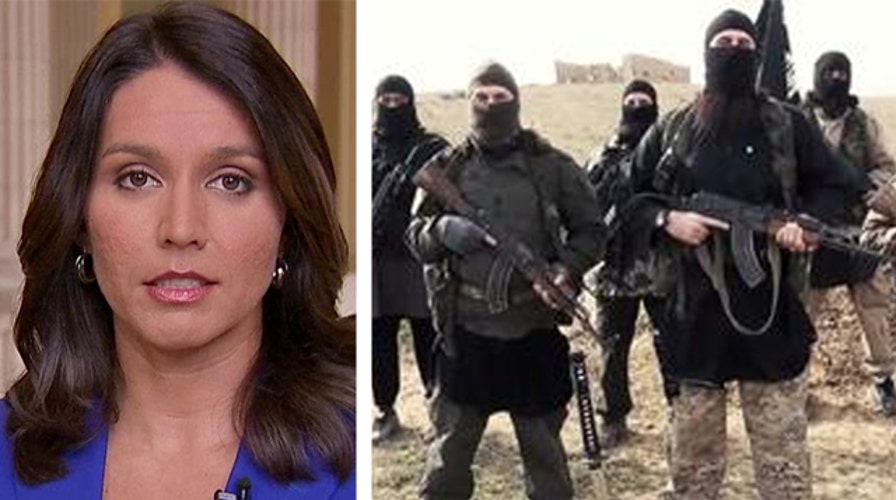This is a rush transcript from "Your World," March 24, 2015. This copy may not be in its final form and may be updated.
(BEGIN VIDEO CLIP)
MITT ROMNEY, FORMER PRESIDENTIAL CANDIDATE: And I think that the White House is trying to minimize Bibi Netanyahu and minimize Israel`s concerns, at a time they want to push through their own agreement with Iran.
(END VIDEO CLIP)
NEIL CAVUTO, HOST: All right, now to Hawaii Democratic Congresswoman Tulsi Gabbard, who says, well, if that`s the case, it needs to stop.
Congresswoman, good to have you back.
REP. TULSI GABBARD, D - HI: Aloha, Neil.
CAVUTO: What do you make of what Governor Romney was saying here, that we have got essentially our priorities screwed up?
GABBARD: Well, I think there`s a lot of noise being created about this rift between President Obama and Prime Minister Netanyahu.
But if you look at the United States Congress, there remains a bipartisan resolve on two things, first and foremost, our goal and objective of making sure that Iran does not have the ability to create a nuclear weapon, and, secondly, our resolve to maintain and continue to grow our longstanding bipartisan friendship and partnership with Israel.
And so that`s really where, I think, we should be focusing as we look at the path forward.
CAVUTO: You know, Congresswoman, much has been made of the fact that, you know, the administration is angry at Benjamin Netanyahu, first of all, for the backtracking on the Palestinian state issue, then about Arab voters in Israel and whether they were coming to the polls in droves. But the president kept relaying this, and not letting go of this.
And I have talked to some Republicans who said, it`s time to let go, time to move on. Now it comes on a time when we`re hearing that the biggest terror groups, Al Qaeda, Boko Haram, and ISIS are doing joint terror exercises. Are they right? Is there something to that, that we`re getting a little too obsessed over slights and not over real threats?
GABBARD: I think we do need to remain very focused on those threats.
I think Prime Minister Netanyahu`s comments on -- his politically expedient comments, as well as his comments about Israeli Arabs, should not have been made. He has apologized for that.
We do have very real threats that we`re facing, a few of which include this negotiation with Iran, but also really the confusion around what is Iran`s status. We have the Director of National Intelligence, James Clapper, omitting Iran and Hezbollah from the list of threats to our country for the first time in a long time. And we also have Iran`s growing influence with their Shia militia and their troops on the ground growing really in Iraq and the ground that they are controlling, as well as in Yemen and in other places.
So, there seems to be really a lack of coherent strategy with regards to how we, as the United States, are dealing with Iran as we look at this threat of nuclear-armed Iran, as well as this threat of Islamic extremists, like ISIS, like Al Qaeda, like Boko Haram, who really it should be no surprise that they are training together, again, because it`s less about the name of a specific group.
The common theme here is that these are radical Islamic extremists conducting these violent terroristic activities. And until we recognize and understand who they are, how they are operating, then we`re not going to be able to have a coherent and winning strategy to defeat them.
CAVUTO: Real quickly, Congresswoman, were you among the 100-plus Democrats in the House who signed this letter that went to the president, I guess, essentially telling him there is a Congress here that weighs in on these treaties?
It was different from the Senate letter signed by 47 senators that went over the president`s head right to Iran. What do you think of that and what it`s telling the president or trying to tell the president?
GABBARD: Yes. Neil, just to be clear, as you mentioned, the two letters, sometimes, it`s easy for people to get confused.
I was part of -- one of 367 bipartisan members of the House of Representatives who sent an open letter to President Obama, not to the leader of Iran, expressing our very real concerns about the negotiations with Iran as they continue and highlighting the fact that Congress and the American people have a say in this process, and we are remaining concerned as this moves forward to make sure that Iran is not in a position where they can develop and become a nuclear-equipped country.
CAVUTO: Have you heard back?
GABBARD: I have not received a letter back.
CAVUTO: Congresswoman, thank you very much. Good seeing you again.
GABBARD: Thank you, Neil. Aloha.

